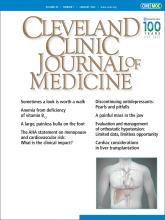Article Figures & Data
Tables
Condition Category Onset, duration Symptoms Discontinuation syndrome Acute withdrawal Onset 36–96 hours
Duration < 6 weeksNew symptoms not present before antidepressant was started or stopped Rebound Onset 36–96 hours
Duration < 6 weeksGreater severity of original symptoms Persistent withdrawal syndrome Onset 24 hours to 6 weeks
Duration > 6 weeksNew symptoms and/or greater severity of original symptoms New episode Relapse Onset < 6 weeks
Duration variableOriginal symptoms at original severity Recurrence Onset > 6 months
Duration variableOriginal symptoms at original severity Based on information in reference 9.
System SSRIs SNRIs TCAs MAOIs Atypicals General Flu-like symptoms Flu-like symptoms Flu-like symptoms Flu-like symptoms Flu-like symptoms Fatigue Fatigue Fatigue Fatigue Diaphoresis Fatigue Cardiovascular Tachycardia Tachycardia Tachycardia Tachycardia (Limited data) Flushing Hypertension, hypotension
SyncopeArrhythmia Arrhythmia Gastrointestinal Nausea, vomiting Nausea, vomiting Nausea, vomiting Nausea, vomiting Nausea, vomiting Diarrhea Diarrhea Diarrhea Diarrhea Diarrhea Anorexia Anorexia Anorexia Anorexia Anorexia (mirtazapine) Neurologic Headache Headache Headache Headache Headache Gait instability Gait instability Paresthesias Paresthesias Dizziness Dizziness Dizziness Tremor, ataxia Tremor, ataxia Paresthesias Paresthesias, brain zaps Parasthesias, brain zaps Seizure Seizure, myoclonus, muscle jerking Tremor Tremor, ataxia Tremor, ataxia Parkinsonism Dystonia (bupropion) Myclonus, muscle jerking Stroke-like symptoms Parkinsonism Parkinsonism Seizure, myoclonus, muscle jerking Dystonia
CatatoniaPsychiatric Anxiety, panic Anxiety, panic Anxiety, panic Depression, lability Anxiety, panic Depression, mania Depression, mania Depression, mania Suicidal ideation Depression, mania Suicidal ideation Suicidal ideation Suicidal ideation Anger, irritability Suicidal ideation Anger, irritability Anger, irritability Anger, irritability Aggression, agitation Anger, irritability Mood swings Mood swings Mood swings Mood swings Depersonalization, derealization Depersonalization, derealization Derealization Hallucinations Depersonalization, derealization Hallucinations Delusions Hallucinations Hallucinations Delusions Cognitive Confusion, delirium Confusion, delirium Confusion, delirium Confusion, delirium (Limited data) Inattention Inattention Inattention Inattention Sleep Sleep disturbances Sleep disturbances Sleep disturbances Sleep disturbances Sleep disturbances Nightmares, vivid dreams Nightmares, vivid dreams Nightmares, vivid dreams Nightmares, vivid dreams Nightmares, vivid dreams Visual Vision changes Vision changes Vision changes Vision changes (Limited data) Sexual Dysfunction Dysfunction Dysfunction Dysfunction Dysfunction MAOIs = monoamine oxidase inhibitors; SNRIs = serotonin-norepinephrine reuptake inhibitors; SSRIs = selective serotonin reuptake inhibitors; TCAs = tricyclic and tetracyclic antidepressants
Based on information in references 6,7,13,14.
Longer duration of treatment Higher dose of drug Shorter half-life of drug Higher receptor affinity of drug Younger patient age History of discontinuation symptoms Abrupt discontinuation High-risk medication (see Table 4) Based on information in references 6,7,14,23,24,26,28–32.
- TABLE 4
Risk of antidepressant discontinuation syndrome (ADS): A summary of antidepressant dosing
Risk of ADS Name (brand name) Starting daily dose (mg) Daily dose range (mg) Typical dose increment (mg) (conservative dose increment) Low Bupropion XL (Wellbutrin XL)a 150 150–450 150 Doxepin (Silenor) 3 3–6 3 Fluoxetine (Prozac)a 10 10–80 10 Levomilnacipran (Savella) 20 20–120 40 (20) Milnacipran (Fetzima) 25 50–300 25–50 (12.5) Vilazodone (Viibryd) 10 10–40 10 Citalopram (Celexa) 10 10–40 10 Escitalopram (Lexapro) 5 5–30 10 (5) Mirtazapine (Remeron) 7.5–15 7.5–60 15 (7.5) Intermediate Sertraline (Zoloft) 25 25–300 50 (12.5–25) Trazodone (Deseryl) 25–50 25–400 50 (25) Vortioxetine (Trintellix) 5 5–20 5 Amitriptyline (Elavil) 10–25 10–300 50 (10–25) Clomipramine (Anafranil) 25 25–300 50 (25) Desipramine (Norpramin) 25 25–300 25–50 (10–25) Desvenlafaxine (Pristiq) 25 50–400 50 (25) Doxepin (Sinequan) 25 25–300 25–50 (10–25) Duloxetine DR (Cymbalta DR) 20–30 30–120 30 (20) High Fluvoxamine (Luvox)b 25 25–300 50 (12.5–25) Imipramine (Tofranil) 25 25–300 25–50 (10–25) Nortriptyline (Pamelor) 10–50 10–150 25–50 (10–25) Paroxetine (Paxil)a 10 10–50 10 (5) Phenelzine (Nardil) 15 7.5–90 15 Tranylcypromine (Parnate) 10 10–60 10 Venlafaxine ER (Effexor ER) 37.5 75–375 37.5






